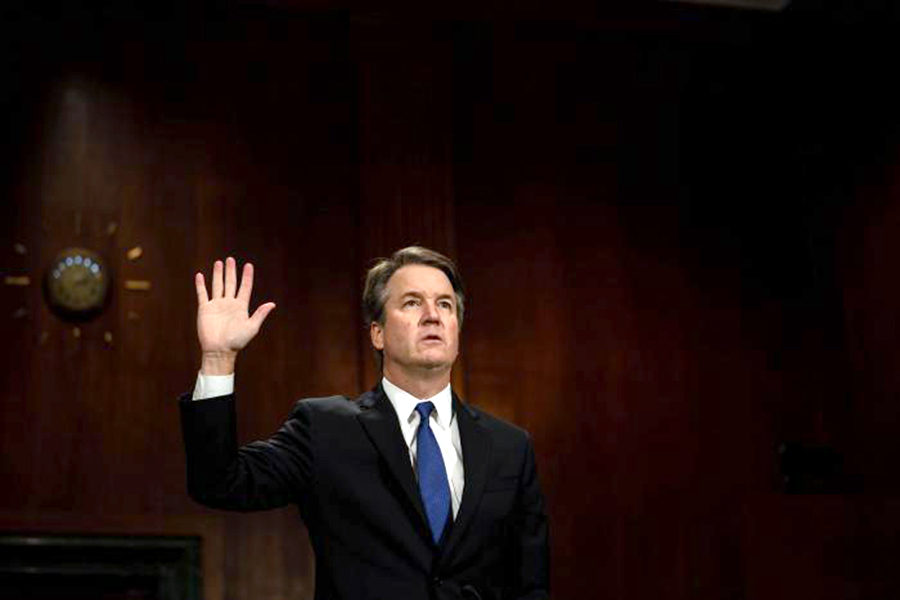Kavanaugh Confirmation Causes Protest; Senate Confirms Nominee 50-48
On Saturday, Oct. 6, Brett Kavanaugh was confirmed to the US Supreme Court in a 50-48 vote. Kavanaugh received the lowest amount of votes of any Supreme Court nominee ever voted on by the US Senate. Kavanaugh’s confirmation was contested, swirled in accusations from multiple women who claimed that he sexually assaulted them when he was in high school and college.
Kavanaugh, a previous US Court of Appeals justice, sped through most of the confirmation process, and was awaiting a vote on his nomination by the Senate Judiciary Committee, which is composed of 11 Republicans and 10 Democrats. Before this vote could take place, the allegations of Dr. Christine Blasey Ford, his first accuser, were made public. She accused Kavanaugh of pinning her to a bed, groping her, and even holding his hand to her mouth as she screamed. In the years previous, Ford told her immediate family of the event and sought therapists’ help. Both Ford and Kavanaugh testified before the Senate Judiciary Committee on Sep. 27, 2018. The other accusers, Deborah Ramirez and Julie Swetnick, were not given an opportunity to make their case in front of the Judiciary Committee.
Those are the facts; this is my opinion: Christine Blasey Ford was credible, and Kavanaugh, fighting for his integrity, made some missteps that should have been worrying and disqualified him from the Supreme Court.
Most people can agree that if Kavanaugh had assaulted women, that should disqualify him from being a justice on the Supreme Court. Some may argue that even if the assault happened, the fact that it happened over 20 years ago means that Kavanaugh has changed.
That argument, however, is reliant on assumption, and doesn’t follow the results of most statistics. According to a study by the Rape, Abuse, and Incest National Network (RAINN) on perpetrators of sexual violence, at least 13 percent of rapists who are released pre-trial committed future crimes before their case was decided. While this may not apply to Brett Kavanaugh, it shows that not all people who commit sexual assault change their ways within the immediate future. And if someone can get away with assault, there is little motivation to change their ways, because they have faced no consequences.
Either way, whether or not Kavanaugh assaulted Ford or other women, some of his behavior exhibited qualities that should not be associated with the image of the US Supreme Court. Kavanaugh’s life had been turned around in the weeks previous, but that is no excuse for the clearly partisan opening statement given by Kavanaugh.
“This whole two-week effort has been a calculated and orchestrated political hit, fueled with apparent pent-up anger about President Trump and the 2016 election, fear that has been unfairly stoked about my judicial record, revenge on behalf of the Clintons and millions of dollars in money from outside left-wing opposition groups,” Kavanaugh said.
Supreme Court justices are supposed to be independent. They are supposed to be the best of the public, people who interpret the law and don’t take sides politically. They may lean, but they are never vocal about where they stand. Kavanaugh’s attack of the Democrats and the left-wing made extremely clear his partisan leanings and should’ve concerned politicians about his ability to make decisions fairly and without personal opinion.
Other parts of his testimony should have disqualified him from being on the court. The Supreme Court is the highest, most revered and respected court in the US, and requires someone with dignity, level-headedness, and respect for fellow justices and citizens. Again, in his testimony, Kavanaugh showed a lack of respect for Democratic member Amy Klobuchar when responding to her question about whether he ever remembered blacking out after drinking too much.
“You’re asking about blackout. I don’t know, have you?” Kavanaugh said.
He then proceeded to answer the question by saying he had not blacked out and then said he was curious whether Senator Klobuchar had ever experienced it.
This testimony could be called part of an ongoing job interview for the position of US Supreme Court Justice. The goal of the hearing was to question both Kavanaugh and Ford and evaluate their credibility, also to assess Kavanaugh’s behavior in his ongoing confirmation process. This was not the time or place for Kavanaugh to ask a question like that, as the hearing was to assess what happened from both his and Ford’s perspective. He could’ve chosen to answer the question directly, yet he decided to be disrespectful and overstep his bounds.
A week-long investigation with limited bounds took place after the testimonies. The investigators did not interview Ford or Kavanaugh, and failed to interview all of the witnesses and possible sources of information around the allegations. The results of the investigation were not released to the public, and a vote was held the day after the investigation by the entire Senate, which confirmed Kavanaugh, with many of the senators who had not made their vote clear eventually voting for Kavanaugh’s confirmation.
Kavanaugh’s confirmation sets a dangerous precedent for the Supreme Court. If our government is willing to confirm accused sexual predators to the Supreme Court, then it seems like they can appoint anybody, no matter how bad they are, to any position in government. That is a scary proposition, but it seems like a distinct possibility. Let’s hope we can prevent it from spreading.








